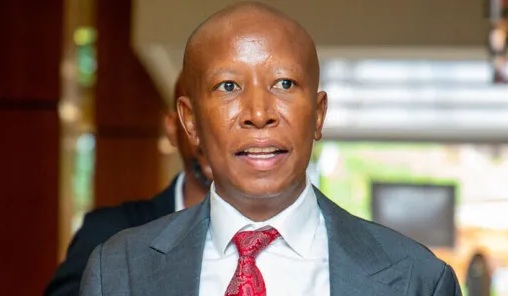The Western Cape High Court has dismissed a legal bid by Economic Freedom Fighters (EFF) leader Julius Malema to stop Parliament from taking disciplinary action against him, clearing the way for the legislature to proceed with proceedings related to his conduct during the State of the Nation Address (SONA) earlier this year.
Malema had filed the urgent application after he and fellow EFF Members of Parliament stormed the stage during President Cyril Ramaphosa’s SONA speech in February, attempting to physically block him from delivering his address. The dramatic incident sparked outrage across South Africa’s political landscape and reignited debate over the limits of protest in Parliament.
In a decisive ruling delivered on Friday, Judge Thulare Mogoatlheng found that Malema’s attempt to interdict the disciplinary process had “no legal basis”, affirming that Parliament was fully entitled to regulate its internal affairs and hold members accountable for misconduct.
“There is no legal basis to interfere with Parliament’s internal disciplinary processes,” Judge Mogoatlheng stated. “The principle of separation of powers must be respected. The judiciary should not encroach upon the legislature’s authority.”
Malema’s application was dismissed with costs.
Parliament Welcomes the Judgment
Reacting to the ruling, Parliament’s spokesperson Moloto Mothapo described it as a victory for institutional integrity and accountability.
“This judgment sends a clear message that no member of Parliament is above the rules. Parliament must maintain order, decorum, and respect for democratic institutions,” Mothapo said.
Parliament is expected to resume disciplinary proceedings against Malema and the involved EFF MPs as early as next week. The possible sanctions range from a formal reprimand to temporary suspension from the National Assembly.
Malema Defiant
Outside the courtroom, a visibly defiant Malema denounced the judgment as politically motivated, accusing the judiciary of shielding President Ramaphosa and the executive from accountability.
“This is not justice. It is politics disguised as law,” Malema told reporters. “We are not shaken. We will continue to confront this government and hold it accountable, no matter the cost.”
The EFF leader, long known for his fiery rhetoric and militant parliamentary tactics, framed the judgment as part of a broader campaign to silence dissenting voices.
A Precedent for Parliamentary Order?
Political analysts say the ruling strengthens Parliament’s hand in enforcing discipline and sets a significant precedent for managing disruptive conduct in future proceedings.
“This decision affirms Parliament’s autonomy and the importance of institutional checks and balances,” said political analyst Tessa Mvulane. “It also sends a message to all political parties that protest must operate within the boundaries of the law.”
As the disciplinary process resumes, attention will turn to how Parliament enforces its standards without triggering further political escalation. For now, the balance between robust opposition and institutional order remains in sharp focus.






















